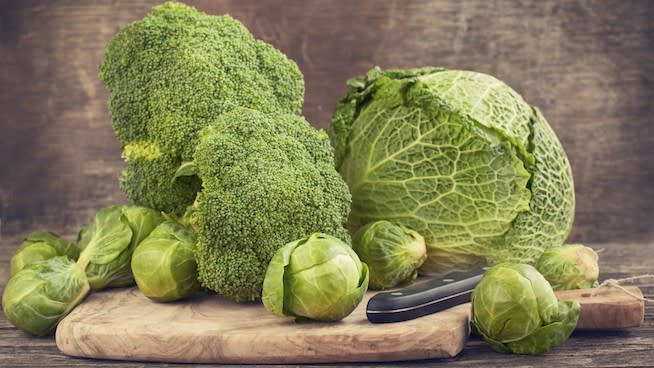These Surprising Veggies Fight Inflammation

Cruciferous Vegetables
If you're not loading up on cruciferous vegetables like cabbage, broccoli, bok choi, Brussels sprouts, kale,and cauliflower, now might be a good time to start. Packed with athlete-friendly micro-nutrients like vitamin A, vitamin C, carotenoids and folic acid, these powerful foods may also help you recover faster after practice.
RELATED: Foods That Fight Inflammation
A recent study in the Journal of the Academy of Nutrition and Dietetics found that higher intake of cruciferous vegetables lowers concentrations of pro-inflammatory markers in the body. Why? Because these veggies are loaded with isothiocyanates, which reduce inflammation by activating detoxifying enzymes. It's important to note that there were some variables in the study, as the subjects also had a higher fruit and vegetable intake overall. Still, eating more vegetables is never a bad thing.
RELATED: The Benefits Of Coffee For Athletes
Eat more of these foods on a regular basis, but know that they can be difficult to digest (they're known as "gas-forming vegetables.") Proceed slowly and adjust your portions as necessary. Don't be afraid to switch between raw and cooked to see what you tolerate best.
Here are a few of my favorite ways to eat cruciferous vegetables:
Brussels Sprouts Salad
Rather than using same ol' spinach all the time, mix up your flavors by using Brussels sprouts as your base. Brussels sprouts topped with walnuts, shredded cheese and a simple dressing make for a quick, delicious lunch.
Roasted Broccoli
Instead of sauteing it or just chomping on it raw, try baking broccoli in the oven at 425 degrees for eight to 10 minutes. Preparing it this way gives it a crisp texture, and some people find it easier to digest. Pair it with some salmon and a drizzle of soy sauce, and you've got one of your go-to dinners during a busy week.
RELATED: Who Eats More: an NFL Player or an Ultra-marathoner?
Cauliflower Rice
This is a low-carb alternative to white rice, leaving room for another whole grain carbohydrate in your meal. It's simple to make, and the texture is nearly identical to white rice.
Kale
Kale is delicious both raw and cooked. It also holds its texture among wet ingredients much better than other greens, making it a great option for when you want to prepare a salad ahead of time. You can also lightly bake kale with olive oil and salt for a tasty snack.
Reference:
Yu Jiang; et al. "Cruciferous Vegetable Intake is Inversely Correlated with Circulating Levels of Proinflammatory Markers in Women." Journal of the Academy of Nutrition and Dietetics. May 2014, Volume 114:5, pp 700-708.
RELATED: Eating Healthy with Cruciferous Vegetables
This article originally appeared on STACK.com: These Surprising Veggies Fight Inflammation

